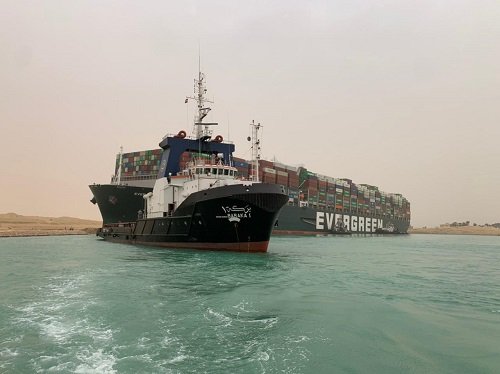The Economic Impact of the 2021 Suez Canal Blockage on Maersk Line
The 2021 Suez Canal blockage resulted in a loss of nearly $89 million for Danish shipping giant Maersk Line, according to a recent study conducted by a European research team in collaboration with the School of Business, Economics and Law at the University of Gothenburg.
The study, titled “The costs of maritime supply chain disruptions: The case of the Suez Canal blockage by the ‘Ever Given’ megaship”, sheds light on the economic and environmental consequences of the six-day blockage caused by the grounding of the Ever Given, one of the world’s largest container ships at the time.
Key Findings
Analysis of ship data revealed that Maersk Line, which accounts for one-third of all commercial ships affected by the blockage, incurred a total loss of $89 million. The largest expense, amounting to $76 million, was attributed to holding container inventories. Ship costs and environmental costs also contributed to the overall financial impact.
Ship costs were calculated by considering daily capital, operational, container, and fuel costs during the blockage period. Environmental costs, on the other hand, were determined by the additional carbon dioxide emissions generated by Maersk’s fleet due to longer voyages and waiting times.
The study also highlighted the broader implications of disruptions in maritime logistics, emphasizing the need for robust contingency plans and alternative transport routes to mitigate future risks.
Implications for Global Trade
As around four-fifths of international trade is carried by sea, the Suez Canal blockage serves as a stark reminder of the vulnerability of global supply chains. The incident not only led to financial losses for shipping companies like Maersk Line but also had significant environmental consequences, with increased carbon dioxide emissions and detours resulting in additional costs for the Suez Canal Authority.
Moreover, the study’s methodology can be applied to analyze other logistical disruptions, such as those in the Red Sea caused by attacks on cargo ships. By understanding the economic and environmental impacts of such disruptions, researchers and industry stakeholders can better prepare for and address future challenges in the maritime sector.
Conclusion
The 2021 Suez Canal blockage underscored the complex interplay between economic, environmental, and logistical factors in global maritime trade. By studying the specific case of Maersk Line’s financial losses, the research team provided valuable insights into the costs of supply chain disruptions and the importance of resilience in the face of unforeseen challenges.
As the shipping industry continues to navigate a rapidly changing landscape, the lessons learned from the Suez Canal incident will be instrumental in shaping future strategies and policies to ensure the smooth flow of goods and services across the world’s oceans.

